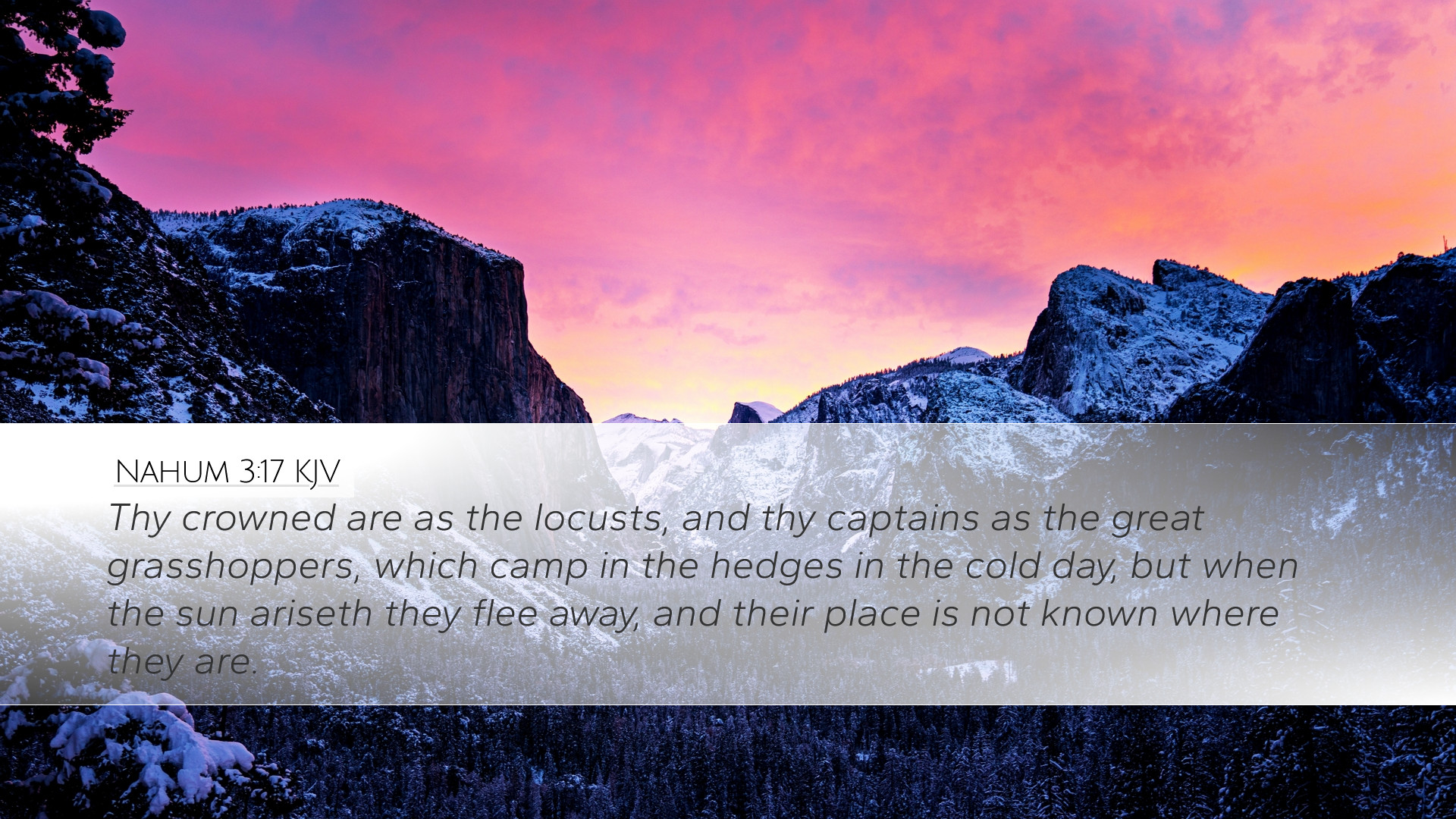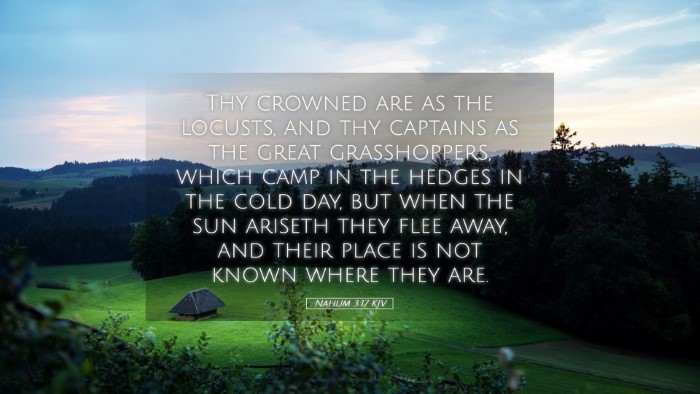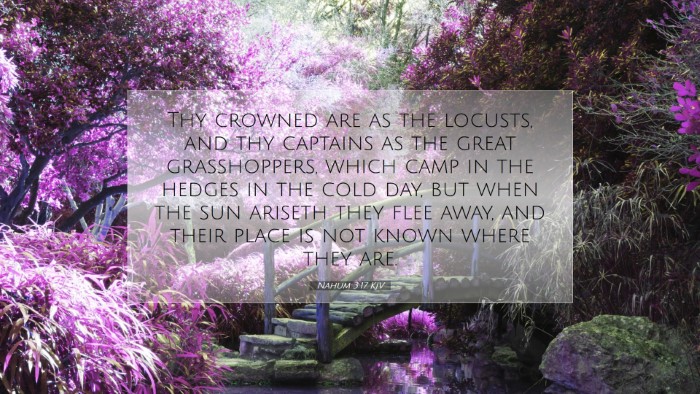Old Testament
Genesis Exodus Leviticus Numbers Deuteronomy Joshua Judges Ruth 1 Samuel 2 Samuel 1 Kings 2 Kings 1 Chronicles 2 Chronicles Ezra Nehemiah Esther Job Psalms Proverbs Ecclesiastes Song of Solomon Isaiah Jeremiah Lamentations Ezekiel Daniel Hosea Joel Amos Obadiah Jonah Micah Nahum Habakkuk Zephaniah Haggai Zechariah MalachiNahum 3:17
Nahum 3:17 KJV
Thy crowned are as the locusts, and thy captains as the great grasshoppers, which camp in the hedges in the cold day, but when the sun ariseth they flee away, and their place is not known where they are.
Nahum 3:17 Bible Commentary
Bible Commentary on Nahum 3:17
Text of Nahum 3:17 (KJV): "Thy crowned are as the locusts, and thy captains as the great grasshoppers, which camp in the hedges in the cold day, but when the sun ariseth they flee away, and their place is not known where they are."
Introduction
The book of Nahum is a prophetic text that focuses primarily on the impending judgment against Nineveh, the capital of Assyria. In this verse, Nahum draws a vivid image of the leadership and military might of Nineveh compared to locusts and grasshoppers. This commentary seeks to unpack the rich meanings embedded in this verse and connect its implications to contemporary Christian thought.
Contextual Analysis
Before we dive deeper into the verse, it’s essential to understand the context in which Nahum speaks. Following a period of repentance among the Assyrians, the book predicts a return to their violent and oppressive ways. The prophetic nature of Nahum emphasizes God’s righteousness and justice, particularly in dealing with nations that embody injustice and cruelty. Therefore, this verse serves as a critical reminder of the ultimate vulnerability of human strength in the face of divine judgment.
Analysis of Key Symbols
Locusts and Grasshoppers
Matthew Henry likens the crowned and captains of Nineveh to locusts, which are notorious for their swarming nature and capacity to devastate. Just as locusts appear in massive numbers but can quickly vanish, so too do Nineveh's leaders appear powerful yet are transient in their effectiveness. This comparison underscores the theme of insignificance in the face of God’s mighty hand.
The Cold Day
Albert Barnes emphasizes the imagery of the 'cold day' as a metaphor for the time of judgment. Just as the cold will send locusts away Seeking warmth, so too will the judgment of God cause the leaders of Nineveh to flee. This phenomenon demonstrates that divine authority and power render human strength impotent when faced with divine will.
Spiritual Applications
- Transience of Human Authority:
This verse teaches us about the fleeting nature of earthly power. As pastoral leaders and theologians, it is essential to recognize that human authority, regardless of its seeming might, is ultimately inconsequential against God’s eternal plans and purposes. This serves as a sobering reminder for those in positions of leadership in the church to submit to God's authority.
- Call to Humility:
In reflecting on the fate of Nineveh’s leaders, believers are urged to cultivate humility. Adam Clarke remarks that those in authority, including church leaders, must remain vigilant and dependent on God’s strength rather than their capabilities. This understanding fosters a heart of repentance and dependence toward God, recognizing our limitations and need for His grace.
- Judgment and Accountability:
Similar to how Nahum's words pronounced judgment on Nineveh, believers today must also consider the accountability that comes with leadership. Leaders are tasked with the stewardship of their people, and this accountability must be taken seriously. The eventual disappearance of Nineveh’s captains serves as a warning that God's justice prevails, and there are spiritual consequences for those who misuse their authority.
Theological Reflections
The theological ramifications of Nahum 3:17 extend beyond its historical context. The verse serves as a reflection of God's sovereignty, illustrating how He uses even the mightiest leaders for His purposes. In prophetic literature, such depictions remind us of the larger narrative of scripture, which consistently reveals God’s hand moving through history toward justice. These reflections call believers to live in faithfulness and trust in divine providence, even when human leaders and systems appear to falter.
Conclusion
In summary, Nahum 3:17 provides profound insights into the nature of power, authority, and the righteous judgment of God. By comparing the captains and leaders of Nineveh to fleeting locusts and grasshoppers, we are reminded of the transience of human strength and the inevitability of divine judgment. This commentary draws together historical, theological, and spiritual insights relevant to pastors, students, and theologians alike, urging all to reflect on the vulnerability of earthly power before the eternal justice of God.


